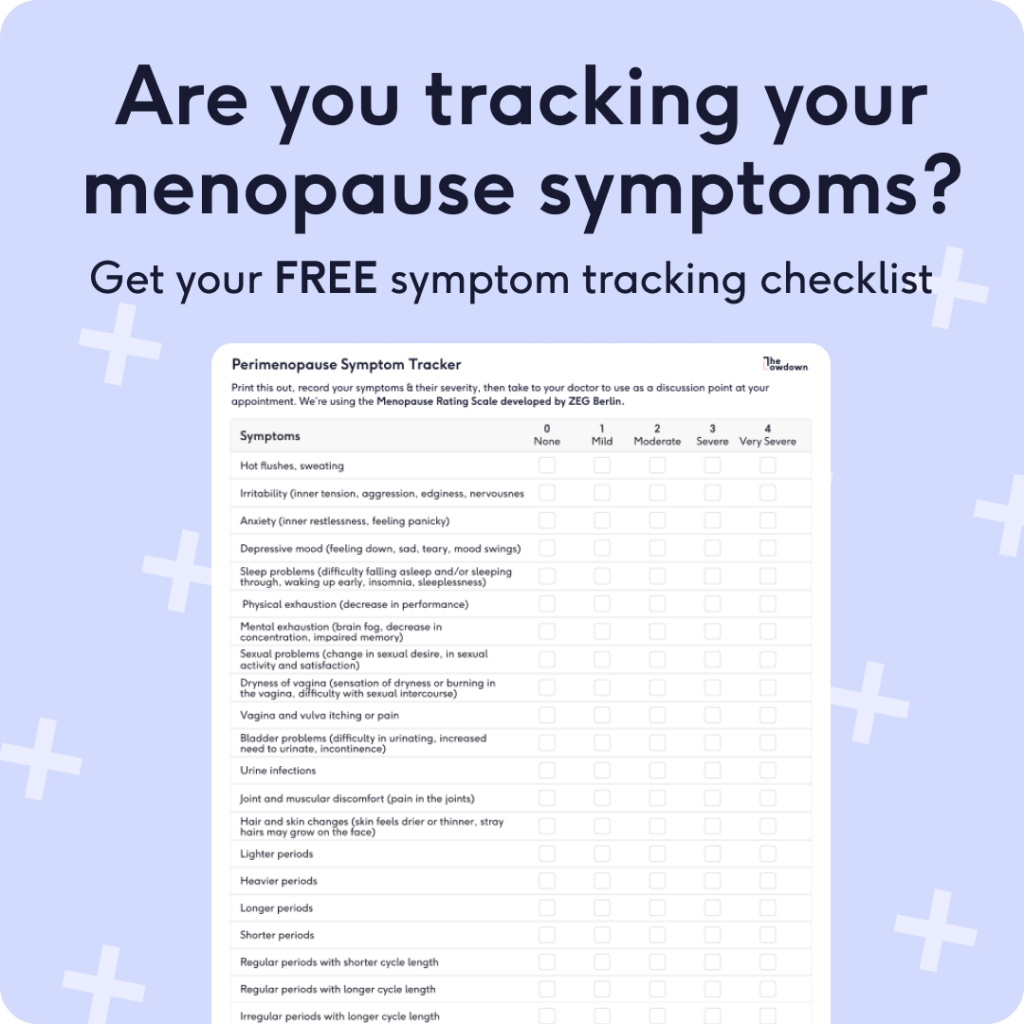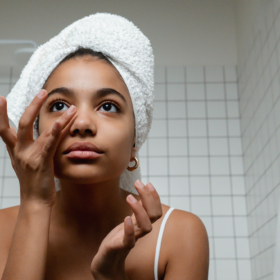
What are the early symptoms of Menopause?
In this article
What's the lowdown?
Menopause is a natural process where the ovaries stop releasing eggs, hormone production decreases and periods stop altogether
Occasionally menopause can occur early. Early menopause is considered to be between the ages of 40-45
Symptoms of perimenopause may include irregular periods, vaginal dryness, hot flushes, mood and sleep changes and these can start before periods stop altogether
Treatment such as hormone replacement therapy and certain forms of contraception can help women experiencing symptoms of perimenopause and menopause
Menopause, the dreaded (but sometimes welcomed) ‘change’ can be a minefield. Previously, limited research on menopause was available despite more than half the world’s population inevitably having to navigate through it all. The great news is that these mindsets, medical understanding and treatments are changing rapidly, and for the better.
What is perimenopause?
Perimenopause, or premenopause, refers to the time leading up to the release of your ultimate egg – the last ovum to leave the ovary and end your cycle. It continues from when perimenopausal symptoms start until 12 months after your last period. This is when your hormonal levels – namely oestrogen, but also progesterone and testosterone – start to fluctuate and decline. Your body may have been VERY happy to stay where it was, used to the hormonal levels it was exposed to cyclically for the last 30 to 40 years. And so these new changes and fluctuations may cause symptoms such as:
- Irregular periods
- Vaginal dryness
- Muscle aches and pain
- Mood changes
- Sleep changes
- Hot flushes
- Night sweats
- Skin and hair changes
- Brain fog
- Tiredness
- Changes to libido
The average age of natural menopause in the UK is 51, but symptoms of the perimenopause can occur in the years before periods stop altogether. So what are the early symptoms of menopause?

When should I start thinking about perimenopause?
You should start thinking about perimenopause in your mid to late 30s. You may not start to experience symptoms until your 40s, but as with anything….knowledge is power! If you start to learn about perimenopause before you start having symptoms, you are more prepared for what may happen and how to deal with it. The symptoms may last for between 4 to 8 years and can start gradually or suddenly. It’s important to know what you’re looking for so you can understand whether changes in your body are due to perimenopause or other medical conditions.
Check out perimenopause FAQs answered by Dr Fran here if you’re looking for quick answers!
What are the first signs of menopause?
Often, hot flushes, night sweats, sleep and mood disturbances are noted prior to menstruation changes, but the earliest symptoms of menopause are irregular, skipped or stopped periods. Everyone is different, so your earliest symptoms may not be the same as the next person’s. Some will only have one or two perimenopausal symptoms for a short period while their bodies are getting used to the new normal in terms of hormonal levels. Others will have every symptom in the book.
But I’m not 50 yet – am I going through early menopause?
Menopause can be diagnosed based on the characteristic symptoms and signs mentioned above if you’re over the age of 45. However, these symptoms could be occurring even if you don’t fall into this age group. The timing of menopause can be categorised as: menopause, early menopause and premature menopause, also known as ‘primary ovarian insufficiency’.
Primary ovarian insufficiency (POI): before 40 years old
When it comes to primary ovarian insufficiency, there are a few reasons why your ovaries are no longer producing oestrogen prior to ‘natural’ menopause.
- If you have a genetic disorder or chromosomal abnormality (such as Turner’s syndrome) you may not have been born with very many eggs to start off with resulting in an earlier decline in oestrogen
- Autoimmune diseases can also cause insufficiency by attacking your own tissues and damaging your oestrogen production
- Similarly if you’ve had surgery to remove your ovaries (often considered ‘surgical menopause’) or if you’ve had chemotherapy or radiation your ovaries may have been damaged and no longer function as normal
- Infections such as tuberculosis and mumps among others can cause changes that may affect ovarian function.
A diagnosis of POI can be a difficult time. The Daisy Network is a patient run support group based in the UK with excellent resources and support.
Early menopause: 40-45 years old
Early menopause can be caused by all of the factors mentioned for causes of primary ovarian insufficiency, but also has a genetic/hereditary link. Some research has shown that if your mother went through menopause below the age of 45 then you may too.
Menopause: 45+ years old
All genetically female bodies are born with a set number of eggs. We don’t produce eggs on demand like our male counterparts produce sperm. It is because of this that we have a menstrual cycle. Puberty initiates hormonal changes that trigger your sex organs to start working and soon you begin releasing an egg (ovulation) and having a menstrual period if that egg isn’t fertilised, monthly (or there abouts).
Our ovaries are responsible for the majority of oestrogen produced by the body. As the ovaries’ store of eggs reduces, their main function of holding and periodically releasing eggs is no longer required, and oestrogen levels drop. It is due to this hormonal rollercoaster that many of the symptoms associated with menopause occur.
Can you test for menopause?
Menopause and perimenopause are clinical diagnoses which means that if you’re over the age of 45, a healthcare professional should be able to tell if you are going through perimenopause based on a thorough history without any blood tests. A 1 year timeframe with no period above the age of 45 with or without symptoms generally indicates the menopause. There are some special cases that may require testing, particularly if you are under the age of 45 or you wish to stop contraception.
As a doctor, there’s nothing I love more than having a number next to a blood/urine/swab test to give me a definitive diagnosis, this however is not the case for perimenopause. Because our hormones are on a constant rollercoaster, getting a single yes or no answer from a test is almost impossible.
FSH (Follicle stimulating hormone) is released by the brain and responsible for the maturation of your eggs, preparing them to be released, and helps to control your menstrual cycle. The ‘normal’ range for this hormone level is incredibly broad and is dependant on which phase of your menstrual cycle you are in, and your age.
The general principle behind testing for FSH is that the closer to menopause you are the higher your FSH will be, and if you are post-menopausal your raised FSH level will be sustained. This can be muddied by a few factors though.
If you are in perimenopause you may be cycling this month but not next, and therefore the outcome of your test will be purely dependant on when you take it – rather than if you are menopausal.
Contraception containing oestrogen may affect your FSH levels but tests for FSH may be appropriate for women using the progestogen-only pill, implant or hormonal coil to help determine when to stop contraception. We discuss this in more detail in our blog on menopause and contraception in your 40s and 50s.
How are menopause symptoms treated?
For the most part, menopause treatment is simple: getting your oestrogen levels back to a respectable level.
Vaginal oestrogen in the form of creams or pessaries, for example, is a safe and effective treatment for vaginal dryness and associated menopausal symptoms such as discomfort during sex.
Symptoms such as hot flushes can be treated with oestrogen or with non-hormonal options. Oestrogen can be given either as combined hormonal contraception or hormone replacement therapy (HRT). You can check out how the mirena coil impacts menopause on our blog page
HRT comes in many forms and you can choose what is most suitable for you based on your individual circumstances and after discussing the risks and benefits with your doctor. Most people will require combined oestrogen and progestogen HRT if they have a womb.
Lifestyle measures such as eating a healthy diet, exercising regularly, having a good sleep routine and stopping smoking can help manage symptoms of the menopause and improve long term health and wellbeing. Furthermore, by taking nutritional supplements you will find benefits such as stress and migraine relief as well as providing your body with all the right nutrients as it undergoes change.
Whilst hormone replacement is the first line treatment for managing symptoms of the menopause, your doctor may be able to discuss with you the benefits and risks of alternative options for specific symptoms such as psychological therapies, non hormonal medications, and complementary therapies.
For those of us diagnosed with premature ovarian failure there is a little more to take into consideration beyond symptom relief and long term complication prevention. The loss of the chance at your own fertility can be devastating. There are many options in terms of support available as well alternate ways to become a parent.
Why is treating menopausal symptoms important?
Medication for symptomatic relief and management of menopause is entirely your choice. If the symptoms are impacted your quality of life – please seek help!
Oestrogen has protective qualities and when it decreases can cause issues such as osteoporosis and impact on your cardiovascular health. Some studies have indicated that there is benefit in hormone therapy for women younger than 60 or within 10 years of menopause symptom onset and is especially important for those with primary ovarian insufficiency.
We have amazing women’s health GPs here at The Lowdown, who can provide advice to help you navigate the seemingly scary world of HRT.
Our medical review process
This article has been medically reviewed for factual and up to date information by a Lowdown doctor.





